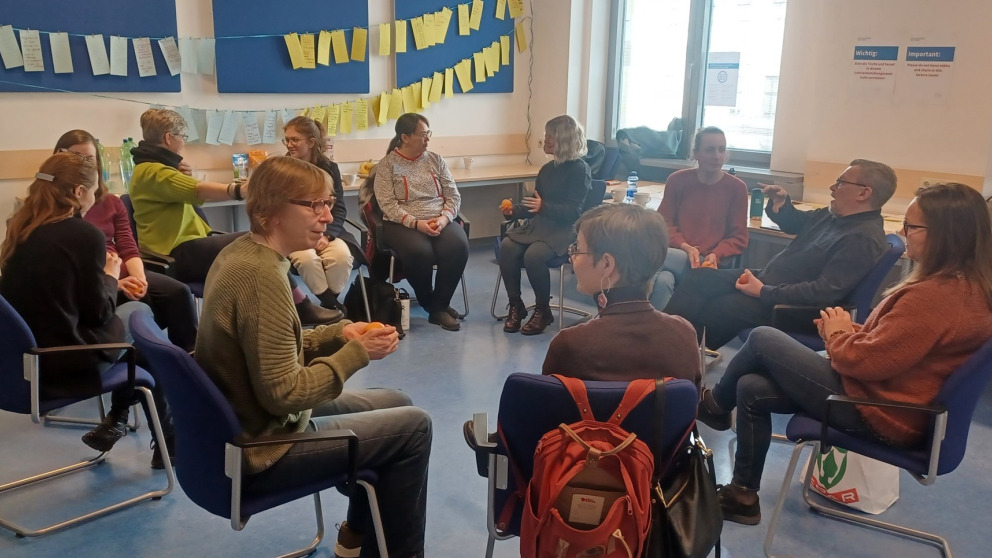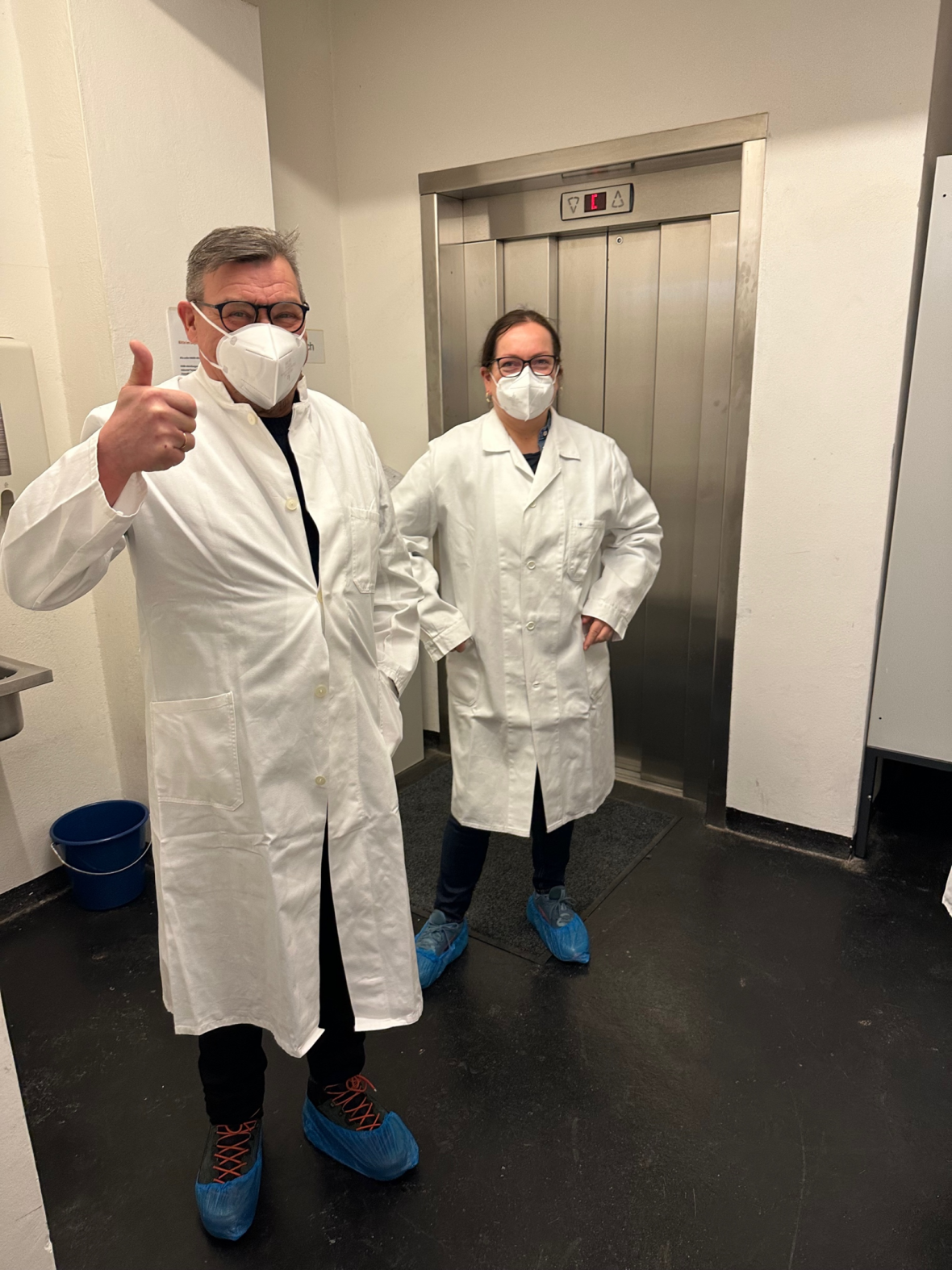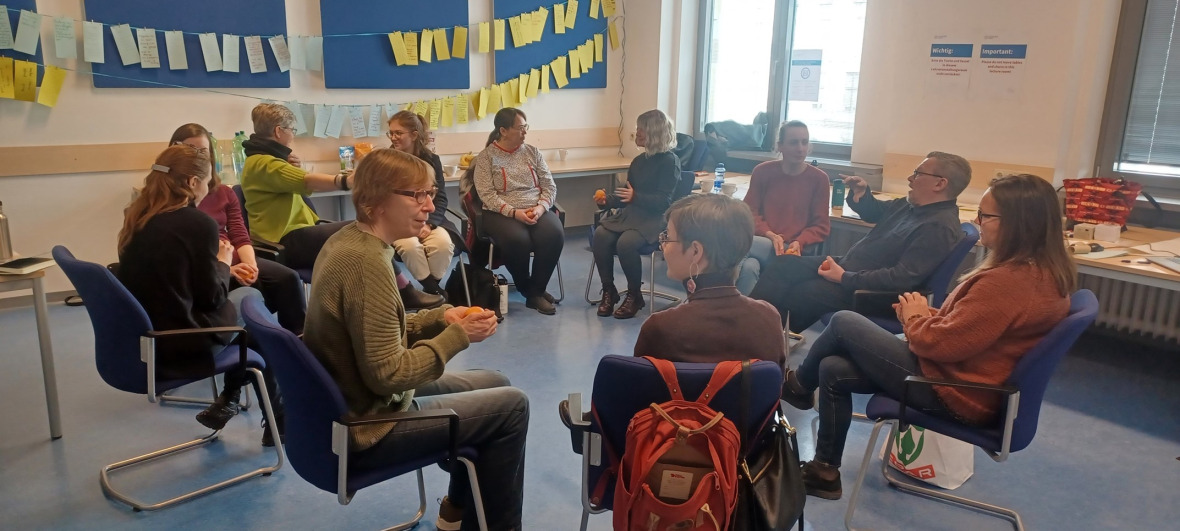Building a network for sustainable research relationships
13.04.2023

At the end of February 2023, the research project DÁVGI: Co-creation for biocultural diversity in the Arctic held the second in a series of workshops aimed at further establishing and strengthening CO-CREATE, a collective of like-minded Indigenous and non-Indigenous researchers. Partners from institutes from across the Arctic and Europe, including the Saami Council, University of Alaska Fairbanks (UAF), Ecologic Institute, Ikaarvik, Oulu University, the Research Institute for Sustainability Potsdam (RIFS), and the University of Tromsø (UiT), met in-person in Vienna, Austria, in connection with the Arctic Science Summit Week conference, to reflect on how the group has been working together and will continue to do so. The workshop provided the time and space to co-reflect on ways of working together, shared goals and premises, and how to communicate this work to potential collaborators. The process of co-designing a website is central to the workshop series, as a tool and method to ‘think with’ and exchange perspectives, opinions and thoughts within the network.
Co-creating the workshop program
At its core, DÁVGI seeks to apply co-creative methods and reflect on the nature of co-creative partnerships. Accordingly, all partners had opportunities to shape the workshop in order to create a truly impactful experience. The content and structure of the program built upon the momentum and insights gained from the previous workshop, and were further refined in subsequent online meetings. The program adapted as CO-CREATE’s needs and understandings evolved over the months prior to the Vienna workshop. This approach ensured that the final program was both relevant and engaging. All CO-CREATE partners contributed their time, skills, and interests to making the workshop a success.
Honouring relationships
A ceremony is a set of carefully thought-out acts for an important occasion; CO-CREATE understands that working together is a ceremony that honors our relationships with each other and the knowledge shared and produced. Being a human first and a researcher second is important to decolonial, co-creative work. As such, the workshop allowed ample space to support participants in getting to know each other within a cultural context; the sessions drew from participants’ backgrounds and personal experiences.
The workshop began on February 24 in an informal setting rather than a conventional meeting room. Local host Gertrude Saxinger (Universität Wien) welcomed CO-CREATE to Vienna and prepared museum visits to share Viennese culture and spark discussions on Arctic research and the need for decolonial methodologies, including a visit to the Weltmuseum, where participants discussed repatriation politics and museology surrounding objects in the museum archive (Figure 1). Over three days, participants strengthened their relationships and envisioned future collaborations. Participants also shared their expectations of the reflections over the following three days.

Reflecting on working together
The reflection sessions began on February 27. Jan-Erik Henriksen, a Sámi elder and professor of social work (UiT) guided the sessions, providing introductory and concluding thoughts and centering exercises. First, Charleen Fisher (UAF) led a session Indigenous communication protocols and prompted a discussion about what protocols CO-CREATE participants might hold in common, such as listening to understand, creating safe spaces for difficult conversations, valuing of humor, connecting to generations, and following seasons. Then, Evie Morin (RIFS) and Thora Herrmann (University of Oulu) guided a session in which participants had time to reflect individually on their motivations for working with CO-CREATE and future ambitions for the collective.

The following day, Jan-Erik Henriksen and Nina Hermansen of the Indigenous Voices (IVO) research group at UiT) led creative sessions about CO-CREATE’s working relationships and how to represent these symbolically. They began by paying tribute to young Sámi activists who were protesting the continued operation of wind turbines that Norway's Supreme Court has deemed to violate the Sámi's protected cultural rights. Next, Jan-Erik shared a Sámi communication model, including how to welcome guests, deal with conflict, and understand silence. Nina Hermansen then introduced some playful, small-group exercises to illustrate group dynamics and consider how CO-CREATE will work together (Figure 3). This stronger internal understanding of how the collective will work together primed the subsequent discussion on how to communicate CO-CREATE externally through a name and logo.

Anne Chahine (RIFS) started the final day with a storytelling session to highlight the diverse understandings and explanations of co-creation within the group, which shape how and why CO-CREATE works together. Each participant was asked to bring an object that represents co-creation to them, and explain why. Examples ranged from research and work experiences to household items and artwork (Figure 4). Then, Nina Döring led a discussion about next steps for DÁVGI and CO-CREATE as a whole. Jan-Erik Henriksen closed the session with an evaluation of the workshop. On reflection, participants felt that most of their initial expectations of the workshop and for their time together had been met.

Next steps
The DÁVGI CO-CREATE Reflection Workshop reminded participants of the origin of the collective – a group of like-minded individuals aiming to positively influence Arctic research and policy. With renewed motivation, CO-CREATE is committed to collaborating on various outputs through the DÁVGI project. Alongside the website, these outputs will include documenting CO-CREATE's co-creative protocols, highlighting important considerations for European Arctic policies, and sharing lessons learned about co-creation and just research relationships. In autumn 2023, CO-CREATE will convene for the third and final DÁVGI gathering, to continue exploring co-creative and decolonial Arctic research methods, reflecting on and celebrating the collective work through DÁVGI, and considering future CO-CREATE projects. Throughout this process, CO-CREATE partners will remain committed to supporting one another's work, applying co-creative and decolonial principles to other projects, reflecting on their collaborative approach, and seeking out additional projects that align with their collective mission of fostering just exchanges and co-creation for biocultural diversity in the Arctic.
